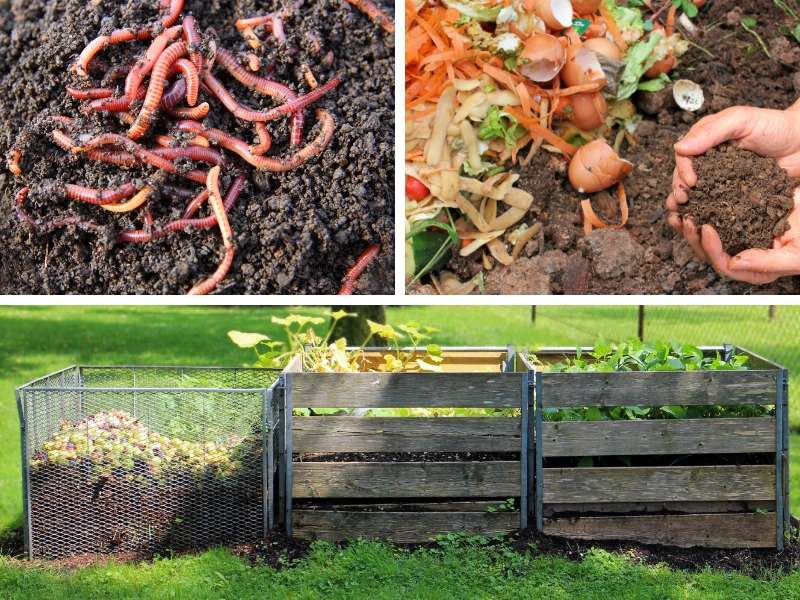Compost consists of decayed organic materials and makes a good fertilizer for your plants. Additionally, worms help your compost because they decompose waste products. In fact, specific types of worms like red wigglers may help speed up the decomposition process. Generally, native earthworms find their way into a compost with an open bottom if the conditions are right.
A compost serves as a mini ecosystem with lots of microbes, fungi, and bugs, which contribute to the process of rotting. Macro-organisms like red wigglers are best to break up organic materials. Their presence is very helpful, but composting occurs irrespective of the type of worms in your compost. With that said, worms can consume a huge amount of decomposing matter in a short time, which makes the composting process efficient.
If you use compost for your gardening needs, we invite you to continue reading to learn the various ways worms help your compost.
6 Ways Worms Help Your Compost

① Improve Your Compost’s Structure
Worms are also helpful in improving the structure of your compost through their tunneling habits. The tunnels of worms enable better water and air circulation within the compost, encouraging aerobic bacteria to do their role in decomposition.
② Boost the Available Nutrients to Plants
If you are planning to start a vegetable garden at home, adding worms in your compost is deemed beneficial. This is because worms in the compost increase the concentration of available nutrients for the plants. As worms digest and eat vegetable food scraps, the nutrients found in the food are transformed into compounds that can be used by the plants. For instance, the nutrients that are already in your plant’s core takes a round through the digestive system of the worms to unlock such nutrients and make them available to the plants.
③ Promote Better Plant Growth
Among the hormones that worms contain in your compost are the hormones, which promote better plant growth. The process of seed germination is encouraged, and the plant’s growth is stronger. With this, the crop yield is maximized. This kind of natural support for plants isn’t available once you use chemical fertilizers. The compost’s distribution through the soil also helps encourage healthy growth of the roots.
④ Protect Plants Against Diseases
Worms in your compost can also be helpful in protecting your plants against any diseases. The microbes present worm compost colonizes the surface of the seed within eight hours of planting. These microbes modify the seed chemically as it germinates so signaling between the seed and water mold is interrupted, which prevents pathogens from accessing your plants.
⑤ Improves Overall Decomposition
When it comes to composting, effective conditions require a proper balance of water, air, and organic waste. Once the conditions in a compost becomes very wet or the air can’t circulate, the compost can become smelly. The increased humidity and lack of oxygen will foster oxygen-hating microbes that give off the bad odors.
With worms in your compost, they improve both the chemical and physical decomposition of compost. They also have great properties such as being rich in beneficial bacteria, stimulating plant growth, and more.
⑥ Use Red Wiggler Worms
The whole idea of worm composting or adding worms to a compost is not new. However, if you are planning to add worms to your compost, it’s important to get the right type of worms. Remember that not all types of worms like the conditions in a compost. For instance, if you dig some up from your garden, they might not hang around once you drop them in an open bin.
However, the best worms to add to your compost are red wigglers. These worms are suited to eating the rich organic matter. The red wigglers belong to epigean group, which is a group of invertebrates that tolerate a variety of temperatures. What’s more, they can consume a huge amount of garden waste and kitchen scraps for your compost.
Interestingly, red wigglers process half of their body weight in food daily. They also tolerate the tight living conditions and a few red wigglers will reproduce quickly into a massive population.
On the other hand, earthworms are different. Keep in mind that a compost is a harsh environment for typical earthworms. The microbes that feed on waste vegetation may boost the temperature of the compost. For that reason, earthworms never do well in such hot conditions in comparison to red wigglers that have a tolerance for high temperature.
Conclusion
Adding worms in your compost is no doubt beneficial. Worms don’t only protect your plants from diseases and promote better growth, but also encourage an efficient composting process. Just make sure to use the right types of worms for your compost, so you will be able to reap the full benefits of it.
If you have any suggestions or questions, we would love to hear from you in the comments below. We’ve also included some other great links below for all things design.
Images Courtesy of Canva.
10 Signs that You Have a Leaking Basement in Your Home
5 Home Improvement and Remodeling Ideas to Boost Your Home Value





